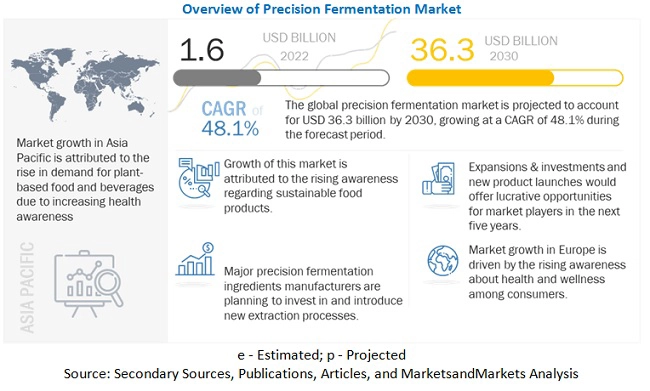
According to a research report “Precision Fermentation Market by Ingredient (Whey & Casein Protein, Egg White, Collagen Protein, Heme Protein), Microbe (Yeast, Algae, Fungi, Bacteria), Application (Meat & Seafood, Dairy Alternatives, Egg Alternatives), & Region – Global Forecast to 2030″ published by MarketsandMarkets, the global precision fermentation market size is estimated to be valued at USD 1.6 billion in 2022 and is projected to reach USD 36.3 billion by 2030, recording a CAGR of 48.1% in terms of value. Production of precision-fermented ingredients with a less carbon footprint is expected to drive the precision fermentation market.

Drivers: Growing adoption of vegan as well as meat-free lifestyles
According to the Food Revolution Organization survey in 2018, 50% of respondents supported the slaughterhouse ban. Furthermore, respondents confessed that they are uncomfortable with the ways the animals are treated in the food industry; therefore, consumers are shifting toward animal-free products. To fulfill the requirements of vegan consumers, manufacturers introduce various plant-based products in the market, which incorporate animal-free ingredients from various sources such as plants and microbes, thereby boosting the precision fermentation market. In major countries like the US and UK, a substantial increase in the population adopting vegan and meat-free lifestyles has been seen. Also, in 2018, it has been observed that the number of vegans in the US increased by 600% in the last three years as per the Food Revolution Organization.
By ingredient, the egg white segment accounts for around one-tenth of the global share.
The demand for plant-based substitutes for meat, egg and dairy products has increased significantly over the past few years across different food types and applications. This trend has been propelled by many reasons, including sustainability, allergenicity, and consumer shifts toward flexitarian diets. Shifting products from eggs to plant-based egg substitutes is motivated by different elements, including some more relevant factors to consumers and others of specific value to food producers.
By microbe, the algae segment constitutes around one-fourth of the global demand.
More than half a century has passed since the idea of eating algae was first proposed. However, t t has not gained much traction as an alternative protein source. Startups like Sophie’s BioNutrients and Noblegen and major corporations like Nestle and its Corbion alliance are competing to develop the next generation of microalgae-based ingredients.
The key factors driving the Asia Pacific precision fermentation market are the changing lifestyles of consumers, the rapid growth of the middle-class population, and rising consumer awareness about health & fitness. Also, investments and expansions in the region drive the growth of the Asia Pacific market.
The Asia Pacific region is projected to grow at the highest CAGR in the precision fermentation market during the forecast period
This report includes a study on the marketing and development strategies, along with the product portfolios of leading companies. It consists of profiles of leading companies, such as Geltor (US), Perfect Day, Inc. (US), The Every Co. (US), Impossible Foods Inc. (US), and Motif FoodWorks, Inc. (US).
